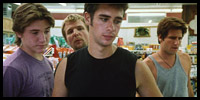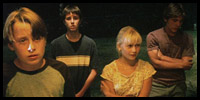
 |
|
Mean Creek (2004) Cast: Rory Culkin, Carly Schroeder, Scott Mechlowicz, Trevor Morgan, Ryan Kelley, Josh Peck, Brandon Williams, Heath Lourwood 2004 – 87 minutes Rated: Reviewed by Dustin Putman, August 6, 2004.  Superlatively written and directed by Jacob Aaron Estes, "Mean Creek" puts a grim twist on the coming-of-age genre and musters up one of the most harrowing and accurate cinematic experiences so far this year. Emotionally piercing and pretty close to faultless, the film takes an unblinking look at the human condition—its simultaneous diversity and parallelism—of six friends faced with an unexpected downward spiral of tragic events. There are no easy answers offered, no directorial pretensions, no false melodramatic crises, and no neatly-packaged ending. Without even a speck of obvious sentimentality or forced humor to relieve its unmitigated candidness, "Mean Creek" is a frightening journey into the heart of human darkness and morality.
Superlatively written and directed by Jacob Aaron Estes, "Mean Creek" puts a grim twist on the coming-of-age genre and musters up one of the most harrowing and accurate cinematic experiences so far this year. Emotionally piercing and pretty close to faultless, the film takes an unblinking look at the human condition—its simultaneous diversity and parallelism—of six friends faced with an unexpected downward spiral of tragic events. There are no easy answers offered, no directorial pretensions, no false melodramatic crises, and no neatly-packaged ending. Without even a speck of obvious sentimentality or forced humor to relieve its unmitigated candidness, "Mean Creek" is a frightening journey into the heart of human darkness and morality. When mild-mannered 12-year-old Sam (Rory Culkin) is undeservedly beat up by taunting, overweight classmate George (Josh Peck), a plan evolves between four friends in their rural Oregon town to embarrass this unlikely bully and teach him a lesson. Along with Sam's teenage brother, Rocky (Trevor Morgan), and Rocky's two friends, leader Marty (Scott Mechlowicz) and straight-arrow Clyde (Ryan Kelley), their plot concerns inviting George out on a Saturday boating trip for Sam's supposed birthday and then abruptly stealing all of his clothes and deserting him while nude in the middle of nowhere. George, who has no friends of note, is happy to accept the invitation, while Sam's innocent crush, Millie (Carly Schroeder), also tags along. Once getting the time to be around him, the group is surprised to find that George isn't the monster he at first seemed to be and they agree to do away with their scheme to play a nasty prank on him. What they don't expect is for a game of "Truth or Dare" to unearth a sea of anger, heated resentment, and teenage immaturity, ultimately leading to a moment of tragic misjudgment they will live to regret.
When mild-mannered 12-year-old Sam (Rory Culkin) is undeservedly beat up by taunting, overweight classmate George (Josh Peck), a plan evolves between four friends in their rural Oregon town to embarrass this unlikely bully and teach him a lesson. Along with Sam's teenage brother, Rocky (Trevor Morgan), and Rocky's two friends, leader Marty (Scott Mechlowicz) and straight-arrow Clyde (Ryan Kelley), their plot concerns inviting George out on a Saturday boating trip for Sam's supposed birthday and then abruptly stealing all of his clothes and deserting him while nude in the middle of nowhere. George, who has no friends of note, is happy to accept the invitation, while Sam's innocent crush, Millie (Carly Schroeder), also tags along. Once getting the time to be around him, the group is surprised to find that George isn't the monster he at first seemed to be and they agree to do away with their scheme to play a nasty prank on him. What they don't expect is for a game of "Truth or Dare" to unearth a sea of anger, heated resentment, and teenage immaturity, ultimately leading to a moment of tragic misjudgment they will live to regret. Viewers familiar with Larry Clark's equally brilliant 2001 docudrama, "Bully," will find "Mean Creek" to hold a number of, albeit superficial, similarities. Both pictures concern a group of teenagers out to seek revenge on a bully, and both depict the hopeless aftermath of said revenge as they get further and further in over their heads. Whereas the plan all along in "Bully" was to kill their malevolent antagonizer, however, the teenage characters portrayed in "Mean Creek" are decidedly more morally sound. Their brand of revenge, while unkind, is nothing but a harmless ploy to get even, and each of them have a firm grasp on right from wrong. Furthermore, the subject of retribution, George, is not an inherently bad kid so much as he is lonely, his occasional obnoxious behavior a desperate attempt to fit in with his peers. Sam, Rocky, Clyde, and Millie recognize this fact and, as their day together moves forward, come to sort of sympathize with George and get second thoughts about their prank. Marty sees it too, but has worked himself up so much in anticipation that he doesn't want to admit George isn't so bad. Without giving away exactly what happens next, a series of adolescent pissing matches are the fundamental source of an eruption of emotions that lead to an accident gone terribly awry.
Viewers familiar with Larry Clark's equally brilliant 2001 docudrama, "Bully," will find "Mean Creek" to hold a number of, albeit superficial, similarities. Both pictures concern a group of teenagers out to seek revenge on a bully, and both depict the hopeless aftermath of said revenge as they get further and further in over their heads. Whereas the plan all along in "Bully" was to kill their malevolent antagonizer, however, the teenage characters portrayed in "Mean Creek" are decidedly more morally sound. Their brand of revenge, while unkind, is nothing but a harmless ploy to get even, and each of them have a firm grasp on right from wrong. Furthermore, the subject of retribution, George, is not an inherently bad kid so much as he is lonely, his occasional obnoxious behavior a desperate attempt to fit in with his peers. Sam, Rocky, Clyde, and Millie recognize this fact and, as their day together moves forward, come to sort of sympathize with George and get second thoughts about their prank. Marty sees it too, but has worked himself up so much in anticipation that he doesn't want to admit George isn't so bad. Without giving away exactly what happens next, a series of adolescent pissing matches are the fundamental source of an eruption of emotions that lead to an accident gone terribly awry. "Mean Creek" invites comparison with another current film, "Garden State," in that both writer-directors—Jacob Aaron Estes and Zach Braff—have pulled off a feature debut that is superior to nearly every other 2004 release, thus far, many of them coming from such deeply respected filmmaking veterans as Quentin Tarantino ("Kill Bill: Vol. 2") and Steven Spielberg ("The Terminal"). There is an energy, a sharp honesty, a spontaneity, and an overall passion Estes and Braff have brought to their respective movies, unblemished by studio greed and cynicism, that has made them transcendent overachievers in the best possible way.
"Mean Creek" invites comparison with another current film, "Garden State," in that both writer-directors—Jacob Aaron Estes and Zach Braff—have pulled off a feature debut that is superior to nearly every other 2004 release, thus far, many of them coming from such deeply respected filmmaking veterans as Quentin Tarantino ("Kill Bill: Vol. 2") and Steven Spielberg ("The Terminal"). There is an energy, a sharp honesty, a spontaneity, and an overall passion Estes and Braff have brought to their respective movies, unblemished by studio greed and cynicism, that has made them transcendent overachievers in the best possible way.  "Mean Creek" is visually bold without being showy, going for muddy greens and browns to not only bring to life the backwater setting, but also to symbolize the murky terrain of these teenage characters' unsure, rebellious adolescence. More important, Jacob Aaron Estes' bold, richly developed account of teenage experimentation and interaction hits the mark at every turn. These characters are never stereotypes and each one feels like someone you might have known growing up, holding traits that not always are the ones expected and with morals that bely the usual cliched representation of kids from lower-middle and middle-class upbringings. Meanwhile, the various touchy relationships that make up this group of six are intricate and exquisitely realized, each one different from the next but always completely plausible to the way real teenagers treat each other. The dialogue they use is fascinating and truthful, sprinkled with casual slang, small-talk, and minimalist pop-cultural references that avoid overly intellectual and too-cute wordiness. And when they are suddenly faced with the unthinkable, feelings of despair, shame, and panic take over. The decisions they make to deal with their predicament are sometimes clumsy, and sometimes misguided, but these are mostly good kids stuck in a horrible situation, and never act any other way than how someone their age might. Further helping to bring these characters to invigorating, emotionally deft life are some haunting music cues from composer Tomandandy (2002's "The Rules of Attraction") and tonally perfect song choices from the likes of John Gold, Ethan Gold, Eels, Wilco, and Orleans.
"Mean Creek" is visually bold without being showy, going for muddy greens and browns to not only bring to life the backwater setting, but also to symbolize the murky terrain of these teenage characters' unsure, rebellious adolescence. More important, Jacob Aaron Estes' bold, richly developed account of teenage experimentation and interaction hits the mark at every turn. These characters are never stereotypes and each one feels like someone you might have known growing up, holding traits that not always are the ones expected and with morals that bely the usual cliched representation of kids from lower-middle and middle-class upbringings. Meanwhile, the various touchy relationships that make up this group of six are intricate and exquisitely realized, each one different from the next but always completely plausible to the way real teenagers treat each other. The dialogue they use is fascinating and truthful, sprinkled with casual slang, small-talk, and minimalist pop-cultural references that avoid overly intellectual and too-cute wordiness. And when they are suddenly faced with the unthinkable, feelings of despair, shame, and panic take over. The decisions they make to deal with their predicament are sometimes clumsy, and sometimes misguided, but these are mostly good kids stuck in a horrible situation, and never act any other way than how someone their age might. Further helping to bring these characters to invigorating, emotionally deft life are some haunting music cues from composer Tomandandy (2002's "The Rules of Attraction") and tonally perfect song choices from the likes of John Gold, Ethan Gold, Eels, Wilco, and Orleans. The six lead performances, bar none, are exceptional, working as a tight-knit unit to become one of the more amazing young ensembles gathered for any movie in the last few years. The conflict they face is completely told from their points-of-views and with no needless cutaways to, say, the parents at home looking worried. In fact, the parental figures are vague peripheries, not showing up until the final act and then only briefly or not at all. This is a wise choice that steers the picture away from the docudrama format and to something more stark, true, and focused. So impeccable is this cast and so heartbreaking are they as they experience something that changes their entire outlook of their lives, that it is difficult to zero in on any one of them without mentioning them all.
The six lead performances, bar none, are exceptional, working as a tight-knit unit to become one of the more amazing young ensembles gathered for any movie in the last few years. The conflict they face is completely told from their points-of-views and with no needless cutaways to, say, the parents at home looking worried. In fact, the parental figures are vague peripheries, not showing up until the final act and then only briefly or not at all. This is a wise choice that steers the picture away from the docudrama format and to something more stark, true, and focused. So impeccable is this cast and so heartbreaking are they as they experience something that changes their entire outlook of their lives, that it is difficult to zero in on any one of them without mentioning them all. Rory Culkin (2002's "Signs") and Trevor Morgan (2001's "The Glass House"), as brothers Sam and Rocky, feel like close actual siblings, with Rocky fiercely protective of his younger brother even as Sam's trust in Rocky, who turns out not to hold all the right answers, is eventually put to the test. Scott Mechlowicz (2004's "Eurotrip") is scarily arresting as the forceful leader of the group, Marty, who suffers from a less-than-savory home life and takes out his frustrations on others. As easy-target Clyde, who must put up with the hurtful ridicule of his peers concerning his two gay fathers, Ryan Kelley (2002's "Stolen Summer") is an auspicious find whose quiet powerlessness to being made fun of is the key to Clyde's poignancy. Josh Peck (2001's "Max Keeble's Big Move") plays against type to vivid, three-dimensional effect as the so-called "bully," George, who masks his dissolution and low self-esteem with a tempered defensiveness that always goes overboard into cruelty. And Carly Schroeder, whose biggest claim to fame has been a recurring role on TV's "Lizzie McGuire" and 2003's "The Lizzie McGuire Movie," is simply astonishing as the sole girl of the bunch, Millie. At first seen as an innocent, naive 12-year-old, one who makes a list of things to talk about with Sam as their "date" together draws near, the ways in which Millie is forced to grow up and deal with issues no one her age should have to in the span of a single, life-altering day is devastating.
Rory Culkin (2002's "Signs") and Trevor Morgan (2001's "The Glass House"), as brothers Sam and Rocky, feel like close actual siblings, with Rocky fiercely protective of his younger brother even as Sam's trust in Rocky, who turns out not to hold all the right answers, is eventually put to the test. Scott Mechlowicz (2004's "Eurotrip") is scarily arresting as the forceful leader of the group, Marty, who suffers from a less-than-savory home life and takes out his frustrations on others. As easy-target Clyde, who must put up with the hurtful ridicule of his peers concerning his two gay fathers, Ryan Kelley (2002's "Stolen Summer") is an auspicious find whose quiet powerlessness to being made fun of is the key to Clyde's poignancy. Josh Peck (2001's "Max Keeble's Big Move") plays against type to vivid, three-dimensional effect as the so-called "bully," George, who masks his dissolution and low self-esteem with a tempered defensiveness that always goes overboard into cruelty. And Carly Schroeder, whose biggest claim to fame has been a recurring role on TV's "Lizzie McGuire" and 2003's "The Lizzie McGuire Movie," is simply astonishing as the sole girl of the bunch, Millie. At first seen as an innocent, naive 12-year-old, one who makes a list of things to talk about with Sam as their "date" together draws near, the ways in which Millie is forced to grow up and deal with issues no one her age should have to in the span of a single, life-altering day is devastating. As "Mean Creek" winds down and the chips are stacked against the characters, writer-director Jacob Aaron Estes avoids the easy route viewers of the Lifetime Network might be suspecting and goes for a denouement that is insightful, genuine, and free of hackneyed, predictable developments. The story Estes tells remains open-ended, which is how it should be for frightened characters (and hypnotized audiences) who already know what is going to happen next even if they don't exactly know. The study of a tragedy both avoidable and accidental, and the ways in which six teens and pre-teens struggle to deal with the inescapable, dire hand they have been dealt, "Mean Creek" is an uncompromising major motion picture achievement that excels its low-budget, independently-made origins. Spellbinding, unsettling, rattlingly provocative, and tautly paced with no indication of amateurish artiness ever peaking through, "Mean Creek" plays like this decade's welcome answer to 1986's "Stand by Me," sure to endure as a watermark of the coming-of-age genre for years to come.
As "Mean Creek" winds down and the chips are stacked against the characters, writer-director Jacob Aaron Estes avoids the easy route viewers of the Lifetime Network might be suspecting and goes for a denouement that is insightful, genuine, and free of hackneyed, predictable developments. The story Estes tells remains open-ended, which is how it should be for frightened characters (and hypnotized audiences) who already know what is going to happen next even if they don't exactly know. The study of a tragedy both avoidable and accidental, and the ways in which six teens and pre-teens struggle to deal with the inescapable, dire hand they have been dealt, "Mean Creek" is an uncompromising major motion picture achievement that excels its low-budget, independently-made origins. Spellbinding, unsettling, rattlingly provocative, and tautly paced with no indication of amateurish artiness ever peaking through, "Mean Creek" plays like this decade's welcome answer to 1986's "Stand by Me," sure to endure as a watermark of the coming-of-age genre for years to come.
|
© 2004 by Dustin Putman |














